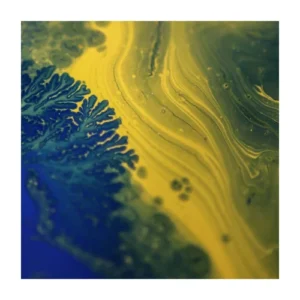Aglae-based inks: a viable alternative to petroleum-based?
Read time: 2-3 mins
Algae-based ink is emerging as an eco-friendly alternative to traditional petroleum-based inks, which contain plastic binders and contribute significantly to pollution. Everyday products like magazines, product packaging, labels, and promotional materials commonly use petroleum-based inks. These inks contain plastic binders and microplastics that contribute to long-term environmental damage.
 Developed from algae biomass, algae-based ink is biodegradable, sustainable, and offers a zero-waste solution for printing needs across various industries, especially packaging. This revolutionary ink starts with spirulina or other types of algae, which are grown and harvested for their pigments. The vibrant colors derived from algae are then processed into ink without harmful chemicals, reducing the need for synthetic dyes that often contain toxic metals and microplastics.
Developed from algae biomass, algae-based ink is biodegradable, sustainable, and offers a zero-waste solution for printing needs across various industries, especially packaging. This revolutionary ink starts with spirulina or other types of algae, which are grown and harvested for their pigments. The vibrant colors derived from algae are then processed into ink without harmful chemicals, reducing the need for synthetic dyes that often contain toxic metals and microplastics.
One of the primary advantages of algae-based ink is its ability to help combat climate change. Algae naturally absorb CO₂ as they grow, converting it into oxygen, making the production process not only low-impact but potentially carbon-negative. This process makes algae-based ink highly sustainable, as algae are renewable, grow quickly, and require minimal resources, unlike petroleum, which is finite and environmentally taxing to extract.
Algae ink’s biodegradable nature means it can break down without releasing harmful by-products, unlike conventional inks, which often end up in landfills, leaching microplastics and toxins into the soil and water. As demand for sustainable printing solutions grows, algae-based ink could significantly reduce the carbon footprint of print media, packaging, and promotional materials. By embracing algae-based ink, businesses can offer consumers a greener choice, supporting the shift toward more sustainable production and helping reduce environmental impact.
What we think
Algae-based ink holds significant promise as a sustainable alternative to traditional inks, especially given its minimal environmental impact and carbon-negative production potential. The primary strengths of algae-based ink lie in its renewable sourcing, as algae grows quickly and doesn’t require fertile land, making it scalable without impacting food resources or biodiversity. Since it’s biodegradable, it offers a more environmentally friendly end-of-life compared to petroleum-based inks, which can release microplastics and toxins.
The Current Challenges
Algae-based ink does face some practical obstacles. For example, achieving the same vivid color spectrum, consistency, and durability as petroleum inks remains a technical hurdle. It can made into shades of green, red, yellow, and orange, but some companies only produce in black. Large-scale printing with algae-based inks may also require specialized equipment and adjustments to existing printing processes, which can be costly for companies to implement. Moreover, current production volumes and the limited number of suppliers can make it difficult to scale algae ink for widespread, industrial-grade use.
In practice, algae ink is gaining traction in smaller-scale, eco-conscious markets. A notable example is “Living Ink”, a company producing algae-based ink for packaging, stationery, and promotional products. Some brands use Living Ink for packaging labels or limited-edition printing, often as part of an environmentally focused brand message. Additionally, HP has experimented with algae-derived materials for ink, demonstrating that even major industry players are exploring this technology.
With growing consumer demand for sustainable alternatives, algae-based ink could see broader adoption in specialty markets. It may eventually become viable for large-scale use if production methods improve and industry costs come down, but widespread adoption may still be a few years away.
What can you do
- Support Brands Using Sustainable Inks
- Prioritize Eco-Friendly Packaging
- Advocate for Sustainable Practices
- Purchase from Small Businesses Using Algae Ink
- Look for Certified Sustainable Printing
- Educate and Share Information
